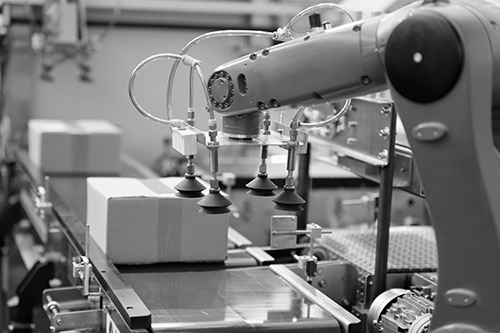Table of contents
Key Takeaways
- Supply chain has moved from a concept to a discipline, bringing more science and process to the industry.
- Over the last three years, about 50% of new drugs have been launched through CDMOs, underscoring their importance to the industry.
- For CDMOs, quality is the number one consideration, followed by innovation and investments.

TraceLink's Roddy Martin interviews senior pharmaceutical supply chain executive Peter Bigelow, President of xCell Strategic Consulting, on the critical role CDMOs play in the pursuit of supply chain agility.
Transcript:
In this episode of the "Patient‑Driven Supply Network" podcast, TraceLink's Roddy Martin talks with senior supply chain executive Peter Bigelow about the critical role CDMOs play in the pursuit of supply chain agility.
Roddy Martin: Peter, it's great to have you join us on this TraceLink supply chain thought leadership podcast series. It's obviously an even greater privilege, because you've been involved with TraceLink for many years right from the early board of advisor days, to where we are today, so welcome. Peter, if you could just introduce yourself and then we can start our discussion.
Peter Bigelow: Great. Thanks so much, Roddy. It's great to see you again and to reconnect. Always have had great interactions with you and appreciate your great thought leadership around the supply chain.
My name is Peter Bigelow. I spent all my career in the pharmaceutical industry: 14 years with SmithKline Beecham, which is now part of GSK, and 14 years with Wyeth, which is now part of Pfizer. I left Wyeth 10 years ago and joined one of the leading CDMO companies called Patheon and served as head of their North America business and as their CEO.
Since I left Patheon, I've started a consulting business. My firm does consulting in the pharmaceutical area in the areas of drug development, outsourcing, and many of the supply chain areas. I’m really pleased to be with you today and looking forward to our discussion.
Roddy: Fantastic, Peter. It's always good to have somebody that's been in the industry and across so many parts of the industry in an interview like this, because it's not as if you're talking to us from within a pharma company, but different pharma companies. It's across some very significant sectors, going from SmithKline all the way to Patheon, that's dramatic change.
Tell us in a nutshell, what have you seen in terms of changes of supply chain as a discipline? I mean right from those early days to Patheon, who are contracted outsourced manufacturers with unique supply chain challenges.
Peter: It's been a huge change. I mean, at a high level, supply chain has gone from being a concept to a discipline. You just used that word, “discipline.” There's a lot more science and a lot more process behind supply chain than there ever was.
I think we've really benefited as an industry. We've gotten more reliable, we've gotten more cost effective, we've gotten more flexible, but there's a long way to go yet. This concept that we've got to really build the science around supply chain really continues to be a burning platform, especially for the pharma industry.
Some companies outside the pharma industry, and you know them well, Roddy, have brought us a long way. We in the pharma industry have used this excuse of being highly regulated and high margin and making really important products. We've used that as a crutch to keep us from moving as fast as we should be moving in this industry.
Roddy: That's interesting. My wife, who didn't necessarily misunderstand supply chain, says, "I hear supply chain now so often on the news. I know what supply chain is about." COVID‑19 has certainly shone a light on the broken stuff in the supply chain. It hasn't always been a positive picture.
Let's talk about agility. "Agility" is a word we're going to hear a lot about because we didn't know it was happening. We did a pretty lousy job of responding because we didn't have visibility. Over your various roles and all the way to Patheon and now you've been in your consulting, talk a little about agility and how you see pharmaceutical companies thinking about agility. Is it really a priority, or are they trying to figure it out?
Peter: Agility, for me, is really about decision making. Making good decisions quickly, being accurate, and setting direction so that everyone's not losing a lot of valuable time or going in the wrong direction.
The way you make good decisions is by having the right resources available to you, having the right data, and having the right people that know the business and can really have the confidence to set direction.
Roddy: I think that that's really appropriate. The minute you say "data" and the other comments you made around cost, so important it is for the CDMOs to get up and running on their technology foundation so that they can exchange data. They have visibility between the brand manufacturer and the CDMOs.
Then we can see when batches fail, or we can see when orders change. We don't wait weeks for that to happen. We can almost see them as they're happening. That data to support real‑time decision making is absolutely becoming more and more critical over time.
Peter: To me, agility results in more reliable production, a more flexible workplace. By cost effectiveness, I don't mean cheaper. I don't have to tell you this, Roddy, I mean leaner. I mean done more smartly with less waste in ways that produce a better product, a higher quality product, at a lower cost.
Roddy: I've written a couple of articles and so have other thought leaders in TraceLink around patient‑centric. What does that really mean? For many years, it's been one of those places you don't go because of patient privacy. You can't go and start analyzing personal data from patients, etc.
But if you look at the Procter & Gambles and the consumer electronics industry, they've nailed these consumer insights down to a fine art where they know consumers so well that they can actually start manipulating their buying behaviors, whereas we don't want to group patient data because it's private.
As a result, we have terrible demand forecast accuracy. The best we can do is stuff inventory all over the supply chain and hope that it's going to get to a patient. As the patient communities get smaller, that's going to be more and more difficult.
Let's talk a little bit about your Patheon days. Not to talk about Patheon, but generically about the CMOs because the CMOs sit right at the back end, the supply side of the supply chain. They have to react to all the sins and evils that are passed down the supply chain. How do you see their capabilities evolving, because they really are a critical path of the supply chain?
Peter: Absolutely. Just one thing: I currently chair the board of trustees for what's called the Pharma & Biopharma Outsourcing Association, which is the nonprofit trade association that represents the needs and interests of CDMOs.
I stay very involved and I talk to CEOs of all the big CDMOs pretty regularly. It's an incredibly changing business. I would say over the past three years, about 50 percent of all the new drugs that have been launched in the US have been launched through CDMOs. They've become such an important part of our supply chain in the pharmaceutical industry and are becoming a bigger, bigger part of lot of drug development. A lot of the new technologies, a lot of the innovative stuff, is coming out of this CDMO industry. It's become incredibly important.
When I first [inaudible] in this industry, one of the major companies had this tendency to make all their products in all their regions. Maybe they outsourced a little bit of something. Now, it's become such a key part of their strategies to be able to partner with the right companies and to use the capabilities that are already out there rather than build all those capabilities in every company.
Roddy: I think to the point of, not to overplay COVID‑19, but you had a lot of the talk about let's just move our contract manufacturing away from China. It's not quite that simple, because in many cases, many of those relationships with brand manufacturers have been built over 10 years.
You don't wake up tomorrow and say, “I'm not going to manufacture in country X anymore. I'm just going to move it to another country.” Meanwhile, you've jointly developed IP, built manufacturing sites that are unique to that country. It's not quite that simple.
Peter: COVID‑19 has really exposed how little we know about our supply chain. A lot of it's about suppliers' suppliers. You may get an API from one company, but you didn't really realize that that API gets starting material and ingredients from 17 different companies that are located in 10 different geographies.
That's what's really been the biggest hurdle, and one of the biggest things that COVID‑19 has exposed is that we thought we knew our supply chains and we didn't know our supply chains.
When we talk about getting such a high percentage of our products from China, it's not really true. What's true is that a high percentage of our products has at least one component from China, or one component from India, or one component from Europe.
There's just so many geographies involved in all of our products that if there's a problem somewhere around the globe, we're probably going to see it in supply chains everywhere.
Roddy: Right. Acetaminophen and Tylenol, right? You can't make Tylenol without acetaminophen. If you can't get acetaminophen, Tylenol supplies dry up. That's exactly what we're seeing. I think it's interesting to share a little anecdote.
I'm sure you remember the book, "The Development Factory," by Gary Pisano. I once had a long chat with him. Not to quote him verbatim, but he made the point that, "It's been really interesting because if you read the book," he said, "the big pharma companies have lost track of their processes." And I would say, “their supply chains,” which is the point you've just made.
About 10 years ago, I had him on a panel. He said, "It's really interesting. I wrote that book a long time ago and I gave up." He said, "Now, suddenly, 10 years later, everybody's buying the book and reading up what I said 10 years ago about understanding processes, understanding supply chain, how to do tech transfer, and how to build supply chain systems."
I think the big wheel is turning and pharma can no longer cookie‑cutter and expect Patheon and the other CDMOs to just magically start manufacturing in a strange country.
Peter: I have a signed copy of his book. It might be behind me here, Roddy, but you have to be in the industry long enough as you and I have to really know that story. That's great.
Roddy: [laughs] Yeah. He's quite a character. This whole subject of agility, let's go back to that. As you've seen, we're trying to put in an initiative together that is not connected to TraceLink or technology but to define some sort of a manifesto that says, “if we are all in the healthcare industry and we want to see transformation, here's some cool principles that we all want to understand.”
I'm going to go back to that patient‑centric understanding. Because if you look at the consumer electronics, consumer goods industry, one thing that characterizes their strategies is they've got close to that buyer of products. When you're in a contract manufacturer, you're way away from where the patient is.
I remember—and it's public domain, so I can talk about it—Eli Lilly, probably 10, 15 years ago, presented at LogiPharma and said, "We've got 20 really experienced manufacturing supply chain experts sitting in the center in the UK. We work with all of our contract manufacturers, we do assessments with them, they learn from us, we learned from them."
What happened to that? Have CDMOs been left to their own devices and desires? How are the CDMOs developing their capabilities? How did they get any better? Because the partnering culture between pharma and CDMOs is maybe not where it should have been. It's not where Eli Lilly was 20 years ago. Where do you see it today? What keeps the CEOs of these CDMOs awake at night?
Peter: Just a couple of comments, Roddy. There's a couple of accelerators, and COVID‑19 is one of them, that are changing a lot of things. COVID‑19, when we look back on it, it will have moved us quicker than we would have moved without it. Another one is cell and gene therapy and personalized medicine.
You talk about being patient‑centric—it's causing us to be much more patient‑centric because some of the [inaudible] products and some of the other products, it's one patient, one batch.
You talk about vein‑to‑vein time, where if you can decrease the time from when you've taken the blood in the stem cells from a patient, manipulated them, and gotten them back to patient—a couple of days means a difference of life and death. That's caused people to start rethinking how we do things and try to break down barriers and paradigms. I think those accelerators are going to have a really, really big part.
Roddy: I think this is one of the areas that technology is going to play an enabling role—and I say that in a very, very measured way because you can't do this all with technology. For me, the most fundamental aspect of agility is that it's people, process, and technology. It is the ability, like in a case of Amazon, of exchanging data between partners on a network. Amazon has my credit card, they’ve got my address. I just have to click "Buy" and the suppliers ship it through the platform, and it arrives at my house.
How ready would you say, in general, the contract manufacturers are in terms of upgrading their technical capabilities so they can exchange data and make what they do more visible, because it's a sensitive subject.
Peter: It's incredibly critical for contract manufacturers to be as integrated system‑wise as possible with their customers. Meaning, with the companies that are commercializing the products that they manufacture.
It can no longer be a, "We sent in an order 90 days ago. When are you going to be ready to ship it?" It's got to be, what are all the steps that need to take place along the way, and where are we in all those steps?
How can we be totally coordinated so that we can make decisions about those steps and not just hope that after 90 days you finish that product and send it to us? Companies that are really integrated and good at that are going to be the successful ones and the leaders in the future.
Roddy: Just to emphasize that point, without naming the company, I did a project between them and their contract manufacturers, and we interviewed a lot of the CDMOs. One of the common complaints was that the orders get changed by procurement at the last minute, and we can't respond fast enough.
The reality is, and we talked about personalized medicine, we are getting down to much smaller batch sizes and we are going to see much more personalized changes to packaging of product. Therefore, the CDMOs are going to have to be more responsive and have to have some spare capacity so they can deal with or have the agility to be able to respond to these changes. Do you think that they see that or they still trying to figure that out?
Peter: I don't think they're totally there yet, but I think there's been a lot of really good work. You understand the principles of lean. The principles of lean mean that you end up with higher quality, lower inventories, lower cost, lower frustration, if you get lean right, everybody wins.
That's what's so important, and it's taken the world a long time to learn that since Deming and others told us about that. I think in the pharma industry, it's been a bit of a laggard.
But there's a lot of good learning that's going on. I think that, in fact, in the CDMOs who are forced to be lean because their profits are lower and manufacturing is their whole reason to exist, there's some great lean work and lean thinking going on now.
Roddy: Thank goodness for the healthcare industry that lean doesn't have the connotations that it had maybe 10, 15 years ago, where it was only about taking waste and costs out of manufacturing. Nobody ever wrote the book saying that's what lean is. It's really lean from the buyer all the way back into the supply system.
I think healthcare has the opportunity, and this is why patient understanding is so critical, of translating what lean, and agility, and resilience mean, all the way from the patient through hospitals and distributors, all the way back through the CDMOs. I think that technology platforms that allow us to share data and make the movement of the product visible are where this all goes in the future. That's really exciting.
Just to ask you a question, if you had to characterize, perhaps a little unfairly, what do you think the bulk of the CDMO CEOs keep awake at night worrying about? What would you say that is?
Peter: I think they worry about quality all the time, and I'm glad they do. If they didn't, that would not be good. Quality has to be something that's front of mind all the time. If you're a CDMO and you have compliance issues, if you have quality issues, it's a non-starter for your customer base.
If the first thing they think about isn't quality—and I know it is, any good CEO is talking about quality—I think they're thinking about innovation. They're trying to skate to where the puck is going to be, not where it is, and trying to look at three to five years down the road. How do they have facilities and processes that can make the right products in the right way?
I think they're all concerned about capital and making sure they're making smart investments in their facilities and in their resources. I think systems is a really important thing for them. To make sure that systems and processes in their facilities support the needs of their organizations.
Roddy: That's right because in many cases, if I'm not mistaken, the CDMOs inherited or purchased sites from big brand manufacturers. So, they took those sites over with all their systems, and they may be doing work for 5, 6, 10 pharmaceutical companies with all the systems they inherited from each of them. That can't be an easy job to be agile and responsive when you have such a complex plethora of systems and technologies.
Peter: The way they invest and the way they prepare for the future is really important. Because like you say, a lot of the capacity out there in CDMOs is facilities that have been spun out of large pharma. They're not all that [inaudible].
Some other companies are, Vanda, for an example, they've anticipated where capacity would be needed, and they've built a lot from their own. But a lot of companies are dealing with bricks and mortar that have to be modified and aren't easily modified, but have to be evolved over time.
Roddy: Peter, just to close, if you had to give one piece of advice to the leader of a CDMO supply chain organization, a piece of practical advice based on the learnings from COVID, the challenges we see with personalized medicine going forward, what would that be? What would you say they really need to focus on?
Peter: Be seen as a partner. It's less about transactions and more about being aligned with your customer and understanding what their needs are and meeting that through the whole process. It’s not trying to just deliver the product they asked for 90 days later but aligning all the way through that process.
Take responsibility. A lot of criticism in the CDMO industry is that we can't accept… liability. You're in this together. Take responsibility, be transparent about problems and issues, and be innovative. Don't be stuck with barriers that exist and paradigms that exist but come in with new ideas and new approaches, and let's accelerate us to excellence and not make the journey too long and painful.
Roddy: That's a great point to end on. Because I think that blame game doesn't work. We're trying to be an end‑to‑end, patient‑centric supply chain. When you fragment that supply chain and just assign blame to everybody not delivering, you're never going to make the industry work. To some extent, that's why we are where we are between all the players in the end‑to‑end supply chain. It's just so fragmented.
Peter, thank you very much for making the time. Thank you for being associated with TraceLink for so many years. It's a great privilege to have you, having been in so many parts of the industry over the years. It's a real great privilege to be talking to you. Thank you very much.
Peter: My pleasure. Thanks for having me today.
Roddy: Thanks, Peter.
Return to: The Patient-Driven Supply Network






